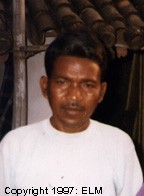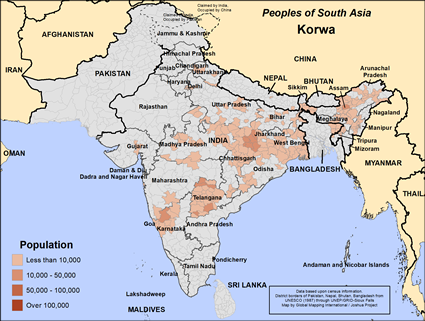Korwa in Bangladesh

Photo Source:
Bethany World Prayer Center
|

Map Source:
People Group data: Omid. Map geography: UNESCO / GMI. Map Design: Joshua Project.
|
| People Name: | Korwa |
| Country: | Bangladesh |
| 10/40 Window: | Yes |
| Population: | 4,200 |
| World Population: | 455,200 |
| Primary Language: | Sylheti |
| Primary Religion: | Hinduism |
| Christian Adherents: | 0.00 % |
| Evangelicals: | 0.00 % |
| Scripture: | New Testament |
| Ministry Resources: | Yes |
| Jesus Film: | Yes |
| Audio Recordings: | Yes |
| People Cluster: | South Asia Hindu - other |
| Affinity Bloc: | South Asian Peoples |
| Progress Level: |
|
Introduction / History
According to popular legend, the Korwa were the original inhabitants of the Surguja district in Madhya Pradesh. In the early 1900s they were leaders in the region and were dubbed as chiefs until more powerful and numerous conquerors invaded. They were later regarded as a wandering gang of looters. They formerly used slash and burn agriculture, moving every two or three years to cultivate newly cleared plots. Rice, millet and vegetables were the principal crops. Their income was supplemented by selling forest products, particularly firewood. There remain two very distinct Korwa tribes: the Diharia (or Kisan), who are farmers, and the Paharia (or Benwaria), who live in the hills. These two tribes do not intermarry. The Korwa people live in the hills, valleys and forests of Uttar Pradesh, Bihar and Madhya Pradesh. A smaller number live in Bangladesh.
What Are Their Lives Like?
The Korwa are primarily farmers. The geographical isolation of the Paharia Korwa (hills dwellers) and the lack of communication have reduced most of them to the position of farm servants. Few of them own their own land. A major portion of their farmlands has been mortgaged to the neighboring tribal and non-tribal communities. Korwa farmers seldom have agricultural surplus to take to market. When they do go to market, cunning merchants often take advantage of their lack of education and illiteracy, buying their products at absurdly low prices and making them loans at extremely high interest rates. The plains dwellers live in villages that are mixed with other tribal groups. Wooden or bush fences surround their farms or homesteads. The Korwa who live in the hills still lead a semi-nomadic lifestyle. The family is the basic social unit among the Korwa. They have a traditional family structure in which the father's word is law and is respected by all. Men and women are free to choose their own marriage partners, but the groom's family must pay a heavy bride price. Newlywed couples live with the grooms' parents until they are able to set up their own households. Men usually marry later in life because they have no means of supporting a family.
What Are Their Beliefs?
Most are ethnic religionists who have been heavily influenced by Hinduism. Their main tribal god is called Dulha Deo. Those who live in the Surguja district worship Khuria Rani, a goddess who requires animal sacrifices. They also practice ancestor worship, calling on the spirits of their ancestors for blessings and guidance. They regard fire as sacred. In fact, fires are kept burning 24 hours a day in their houses to keep evil spirits away.
What Are Their Needs?
The Korwa people need training in skills that will help them flourish in the decades to come.
Prayer Points
Pray for a "Book of Acts" type of movement to Christ among the Korwa people. Pray for the Korwa people to understand and embrace that Jesus wants to bless their families and neighborhoods. Pray for Holy Spirit anointed believers from the Korwa people to change their society from within. Pray for a spiritual hunger that will lead the Korwa people to the cross.